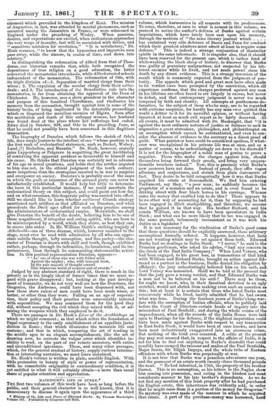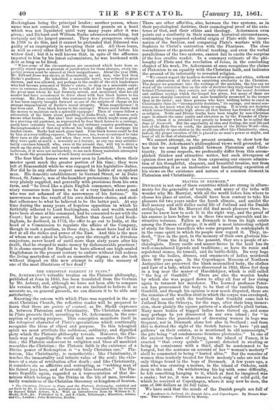IIACKNIGHT'S LIFE OF BURKE. * THE first two volumes of this
work have been so long before the public, and their general character is so well known, that it is unnecessary to discuss it again upon the appearance of a third
• Etiatory of the Life and Mures of .Edmund Burke. By Thomas Maeknight. Volume III. Published by Chapman and Ball.
volume, which harmonizes in all respects with its predecessors. To come, therefore, at once to what is newest in this volume, we proceed to notice the author's defence of Burke against certain imputations, which have lately been oast upon his memory, through the medium of "the same literary journal which . . . . has contained very able defences of Bacon and Penn for conduct which their greatest admirers must admit at least to require some defence." This is indeed a strange conjunction of dissimilar spirits in the same tabernacle. It is singular also, that it should. have been reserved for the present age, which is rather fond of whitewashing the black sheep of history, to discover that Burke was guilty of pecuniary malpractices, not suspected by his bit- terest enemies while he lived, and not made patent since his death by any direct evidence. This is a strange inversion of the result which is commonly expected from the judgment of pos- terity. The appeals which good and great men have often made to its verdict have been prompted by the conviction, which all experience confirms, that the charges preferred against any man in his lifetime are often found to err largely in excess, but never in defect, and that contemporaryjudgment is never too much tempered by faith and charity. All attempts at posthumous de- famation, be the subject of them who he may, are to be regarded with extreme suspicion, for hardly has any man ever quitted this world a debtor to it for its merciful opinion, or without having incurred at least as much evil report as he fairly deserved. At all events, it must be admitted with Dr. Maeknight, that "it is against the most ordinary notions of justice or fairness to seek to stigmatize a great statesman, philosopher, and philanthropist on an assumption which cannot be substantiated, and even to con- sider the absence of evidence to the contrary as a direct proof of guilt. What patriot or hero could be considered spotless, if what- ever was unexplained in his private life was at once, and as a matter of course, to be unhesitatingly set down to his discredit? It is not for the biographer of a noble man of genius to prove a negative. Those who make the charges against him, should themselves bring forward their proofs, and bring very unques- tionable vouchers indeed." Now, this is precisely what Burke's new accusers have not done. Instead of proofs, they offer vague allusions and conjectures, and shrink from plain statements of fact. They desire to be told categorically how it was that Burke acquired his estate at Beaconsfield. We find him entering Parliament, say they, " a poor man; he suddenly becomes the proprietor of a mansion and an estate, and is even found to be driving about with four black horses in his carriage. Whence came the money that enabled him to do this ? There appears to be no other way of accounting for it, than by supposing he had been engaged in illicit stockjobbing, and therefore, we assume that he gained it in that way. His brother Richard, and his cousin William' are known to have been speculators in India Stock ; and what can be more likely that he too was engaged in the same pursuit, infamously inconsistent as it was with his duties as a legislator ?
It is not necessary for the vindication of Burke's good name that these questions should be explicitly answered, these arbitrary assumptions formally refuted. It happens, however, that facts are not wanting which may be set against ;hem both. Edmund Burke had no dealings in India Stock. "I never," he said to the Prussian gentleman, who asked his advice, "had any concern in the funds of the East India Company." When Lord Verney, who had been engaged, to his great hose, in transactions of that kind with William and Richard Burke, brought an action against Ed- mund as a partner in the business, Burke denied his obligation by affidavit; the jury unhesitatingly believed him on his oath, and Lord Verney was nonsuited. Shall we be told at the present day that the jury gave a wrong verdict, and that Edmund Burke was a man not to be believed on his oath ? There may be those, for aught we know, who, in their fanatical devotion to an ugly crotchet, would not shrink from making even such an assertion as this ; but at least it is certain that those who hated Burke most rancorously while he lived, tacitly admitted that he had sworn what was true. During the fourteen years of Burke's long war- fare with the corruption of Indian officials when he publicly laid before the Court of Directors certain heads of inquiry into the misconduct of Paul Bonfield; and during the whole course of the impeachment, when all the records of the India House were laid open to Hastings for his defence, if the slightest imputation could. have been made against Burke with respect to any transaction in East India Stock, it would have been at once known, and have been most industriously exaggerated into an enormous crime. But nothing of the kind ever occurred. A critic at the present day may rest assured that, in respect to the affairs of India, it is not for him to find out anything to Burkers discredit that could possibly have escaped the rancour and malice of the Paul Benfields, Major Scotts, Sir Elijah Impeys, and the whole tribe of Eastern offenders with whom Burke was perpetually at war.
It is not true that Burke was a penniless adventurer one year, and the possessor of an estate worth twenty-three thousand pounds the next. " He had inherited, in 1765, the property of his brother Garret. This is no assumption, as his letters to the Nagles show him coming into possession, and acting in the kindest and most considerate manner to his late brother's dependants. As we do not find any mention of this Irish property after he had purchased his English estate, this inheritance was evidently sold, in order that he might raise from it a portion of the money for Gregories." No mystery was ever made of the manner in which he acquired that estate. A part of the purchase-money was borrowed, Lord Rockingham being the principal lender ; another person, whose name was not concealed, lent five thousand pounds on a bond which was not liquidated until very many years after it was given ; and Richard and William Burke advanced something, but certainly not the largest amount. They were prosperous enough in 1768 to do this, and it cannot be pretended that Edmund was guilty of an impropriety in accepting their aid. All these loans, as well as every other debt left due by him, were paid before his widow died ; but it is well known that, in spite of the affluence imputed to him by his latest calumniators, ho was burdened with debt as long as he lived.
" When some of the circumstances are examined which have been so greedily seized upon as grounds of justification for these charges, every im- partial person must be amazed at their insignificance. About the year 1846, Mr. Edward Jesse was shown at Beaconsfield, an old man, who had been Burke's gardener. He inhabited a miserable hovel, was reduced to great distress, and was allowed, not perhaps to the credit of the rich landowners whq had become 'possessed of Burke's estate, to drag on a miserable exist- ence in extreme destitution. He loved to talk of his happier days, and of tie great man whom he had formerly served, and mentioned that his old master had been accustomed to drive about with four black horses to his carriage. Mr. Jesse recorded this statement in his Favourite Haunts, and it has been eagerly brought forward as one of the articles of charge in his strange impeachment of Burke's moral integrity. What magnificence ! it has been said. Four black horses to his carriage! Where could Burke find the money to maintain such a splendid equipage ? Then of course follow a reiteration of the hints about gambling in India Stock, and Heaven only knows what besides. But alas! that magnificence which might seem great to a starving old gardener, as represented by four black horses to a carriage, could have certainly been equalled by any ordinary country gentleman in Buckinghamshire of that day without his being obliged to mortgage hie landed estate. Burke had much grass land. Four black horses could be fed by him at a very trifling expense. These horses, too, were accustomed to take their turn at the plough, and when they were harnessed to his carriage, they were quite as much a necessity as a luxury, as any one may satisfac- torily, convince himself, who, even at the present day, will try to drive a coach up the steep hills and heavy roads round Beaconsfield. It would be ludicrous, if it were not melancholy, to see such flimsy materials attempted to be made the groundwork of such heavy accusations."
The four black horses were never seen in London, where their master spent much the greater portion of his time ; they were left at Beaconsfield while he was engaged in his legislative duties. Nor did he in any other respect assume the habits of an opulent man. His domestic establishment in Gerrard Street, or in Duke Street, St. James's, was of the humblest pretensions ; his table was very plainly supplied, and generally with provisions from his own farm, and " he lived like a plain English commoner, whose pecu- niary resources were known to be of a very limited extent, and who was not ashamed of the narrowness of his fortune." Its narrowness was the result of his own deliberate choice, and sted- fast adherence to what he believed to be the better past. At any time during the many years of hopeless opposition in which he faithfully adhered to Lord Rockingham, rank and wealth would have been at once at his command, had he consented to act with the Court ; but he never swerved. Rather than desert Lord Rock- ingham, he declined, in 1772, the offer to go out to India, at the head of a Commission to regulate the affairs of the Company, though in such a position, in those days, he must have had at his feet at all the riches and power of the 'East. And this is the man of whom we are asked to believe, upon the strength of a frivolous conjecture, never heard of until more than sixty years after his death, that he stooped to make money by dishonourable practices ! It is shame enough for England to have allowed one high-souled Englishman in the present century to endure without full redress the living martydom of such an unmerited stigma ; can she look without disgust on this new attempt to sully the memory of one of the most illustrious of her dead ?



























 Previous page
Previous page